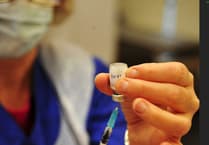MULTIPLE sclerosis patients will soon be able to benefit from pioneering technology to manage their long-term condition from the comfort of their home.
Torbay and South Devon NHS Foundation Trust (TSDFT) has been awarded a £402,000 grant to co-develop a software application for augmented reality (AR) glasses to improve motor function assessments of people with MS.
The grant will help the trust set up the new PARAMS (Parameters from Augmented-Reality-supported Assessments in people living with Multiple Sclerosis) research study and develop its AR MS clinics as part of the drive to use technology to provide care closer to people’s homes.
The PARAMS project is a collaboration between the trust’s multiple sclerosis team led by neurologist Dr Agne Straukiene; Stroll, a leading digital therapeutics company pioneering augmented reality software for people living with neurological disorders; and the University of Exeter.
In March 2022 the trust’s Digital Futures team and Dr Agne Straukiene set up the first MS augmented reality clinic, supported by IQVIA nurses.
The clinic enabled staff to communicate with their patients, and conduct assessments remotely using the HoloLens 2 augmented reality headsets from Microsoft.
The wearable AR headset has many features including sensors, cameras, and advanced optics. A holographic display allows digital content to be placed anywhere to blend with the real world so the user can interact with holographic objects and information.
Dr Agne Straukiene hailed the equipment “a gamechanger” in how people with long term conditions will be cared for in the future.
She said: “The funding will really help us to bring to life our new care model using immersive technology and modernise our current healthcare pathways, driving a more flexible, accessible and more sustainable service. We will focus on care as close to home as possible, and personalise care, centred on what matters to the patient.
“Our current MS augmented reality clinics use AR headsets (HoloLens 2) which allow our team to hold higher quality, remote appointments with our patients, where we can talk and interact with them, assess them and gather important information about their condition.
“Having the right information and technology to enable this to be done efficiently will help us understand the patient’s care needs better and provide the right treatment and management without patients having to leave their home.”
People who are seriously ill, undergoing treatment or who are at end of life have been offered VR based immersive experiences for therapeutic support and VR has also been used to help train staff for real life scenarios.
For updates on the PARAMS research study follow the hashtag #PARAMS on Twitter ad LinkedIn.





Comments
This article has no comments yet. Be the first to leave a comment.